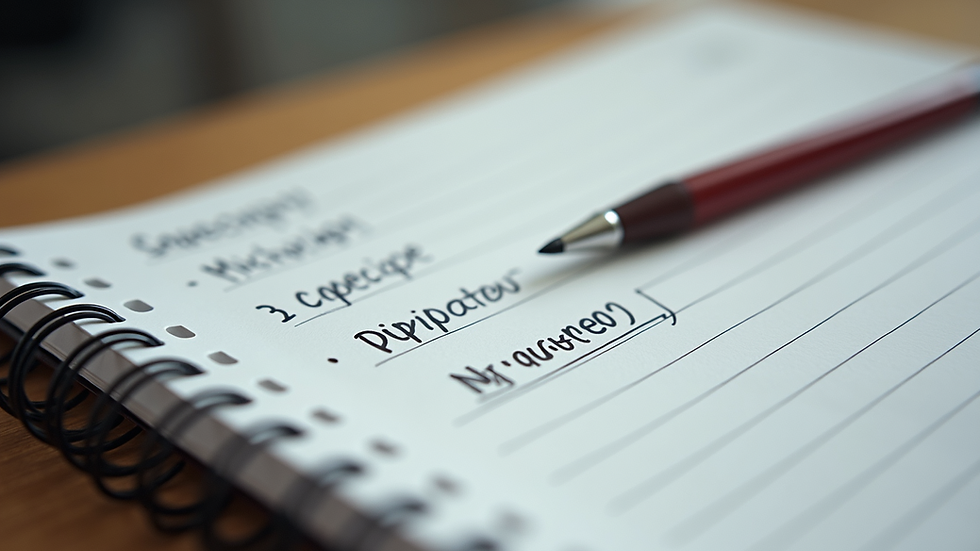Tips to Keep Track of Your Prescriptions and Dosages
- info2214508
- Jul 22, 2025
- 4 min read
Keeping track of your prescriptions and dosages is essential for effective medication management. Whether you are managing chronic conditions or taking medication for a short period, staying organized can prevent errors and ensure your health is well maintained. Here are some practical tips to help you streamline this important task.
Medication Tips: Start with a Medication List
Begin by creating a comprehensive medication list. This list should include:
The name of each medication
The dosage
The frequency of each medication
The prescribing doctor’s name
Having this information in one place will help you avoid confusion and discrepancies. You can keep your list on paper or in a digital format, whichever you prefer. A medication management solution can also assist with this.

Use Pill Organizers
Pill organizers can be a game-changer for keeping track of your medications. These devices come in various sizes and formats, suitable for daily, weekly, or monthly use. They can help you see at a glance if you’ve taken your medication for the day.
Daily Pill Organizer: Ideal for those who take several medications each day.
Weekly Planner: Great for maintaining a schedule and gives a larger overview.
Monthly Divider: Useful for long-term medication management.
These organizers can help reduce the chances of missing a dose or taking the wrong one.

What is a Medication Management System?
A medication management system refers to a comprehensive approach to managing medication. This system encompasses various methods, including electronic health records (EHR), mobile applications, and dedicated software designed to organize prescriptions and dosages efficiently.
Such systems often feature:
Reminders: Automated alerts for taking medications.
Refill Notifications: Automatic reminders when prescriptions are due for refills.
Interaction Alerts: Warnings about possible drug interactions.
Using a medication management system can enhance adherence and keep an organized record of your medication schedule.
Keep a Reminder System
Creating a robust reminder system is crucial for adherence to your medication schedule. You can use:
Alarms on Your Phone: Set reminders for specific times to take medications.
Calendar Apps: Schedule reminders that pop up ahead of time.
Sticky Notes or Visual Cues: Place notes in strategic locations around your home, such as on the fridge or bathroom mirror.
Research has shown that setting reminders can increase the likelihood of medication adherence substantially, especially for those with demanding schedules.

Communicate with Healthcare Providers
Regular communication with your healthcare providers is essential for effective medication management. Make it a habit to discuss your medication list during appointments. This can involve:
Asking questions about your prescriptions.
Informing them of any side effects you experience.
Updating them on any other medications you might be taking.
Educating yourself about your medications enhances your ability to adhere to the prescribed regimen and minimizes the risk of complications.
Use Mobile Applications
With advancements in technology, various mobile applications are available to help manage your medications. These applications often provide features such as:
Medication schedules
Drug information databases
Pill identification resources
Interaction checkers
Using a trusted app can streamline keeping track of your prescriptions and improve your overall safety regarding medication intake.
Ideal Features to Look For
When selecting a mobile app, consider the following:
User-friendly interface
Compatibility with your smartphone
Availability of support and troubleshooting resources
Reviews and ratings from other users
With numerous options, finding the right app can significantly ease the process of managing your medications.
Develop a Routine
Establishing a daily routine can significantly improve how you keep track of your medications. Here’s how you can integrate it into your lifestyle:
Scheduled Times: Take your medications at the same time each day.
Associated Activities: Pair medication intake with daily activities, such as brushing your teeth.
Visual Cues: Position your medications near items in your daily routine, like your toothbrush or coffee cup.
By developing a consistent routine, you'll be less likely to forget your dosages.
Understand Your Medications
To effectively keep track of your prescriptions, it’s vital to understand each medication you are taking. Here are a few key points to recognize:
Purpose: Know what each medication treats.
Side Effects: Be aware of potential side effects and how they may affect your daily activities.
Interactions: Familiarize yourself with any interactions between different medications and how they can affect your health.
This knowledge empowers you to make informed decisions regarding your medications and discuss them with your healthcare provider confidently.
Review Medication Regularly
Periodically reviewing your medications is crucial. Here are some steps to consider during a review:
Assess Necessity: Evaluate whether each medication is still needed.
Check Expiration Dates: Discard any expired medications safely.
Full Disclosure: Update your healthcare provider regarding new medications or changes in dosage.
Regular reviews can help maintain medication efficacy and ensure that your health needs are met comprehensively.
Involve Family or Caregivers
If you find it difficult to manage your medications on your own, consider involving family members or caregivers. Their support can take many forms, such as:
Helping you prepare your medication schedule.
Providing reminders to take your meds.
Attending healthcare appointments to ask questions or take notes on your behalf.
This collaborative approach fosters accountability and improves the overall management of your prescriptions.
Emergency Preparedness
Finally, consider having an emergency plan for your medications. Here are some suggestions:
Carry an Emergency Card: List your medications, dosages, and allergies.
Backup Supplies: Keep extra medication in a safe place in case of emergencies.
Plan for Travel: Always have your medications organized and easily accessible when traveling.
Being proactive about emergency preparedness regarding your medications can offer peace of mind and ensure your health is prioritized in unforeseen situations.
Medication Management Moving Forward
Staying organized and attentive to your medication regimen is crucial for your overall health. Implementing these tips not only simplifies the process but enhances your safety and well-being. Remember, if you ever feel unsure about any aspect of your medication management, don’t hesitate to reach out to your healthcare provider for assistance. Staying informed is the best way to safeguard your health and adhere to your prescriptions effectively.
Using a structured method, like a medication management solution, can greatly enhance your experience and effectiveness. Remember, your health is worth the effort!





Comments